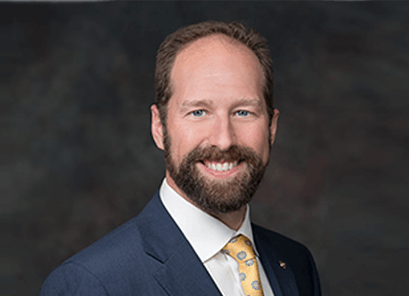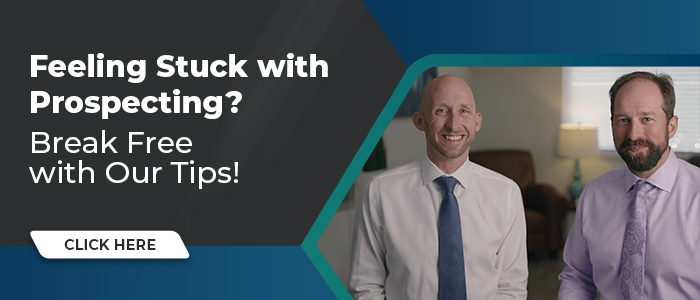Prospecting Got You Down? Here’s How To Turn It Around
Rejection hurts, which is why so many advisors hide from prospecting by playing office. Micah Shilanski, CFP®, shares ways to adjust your mindset around rejection.
4.5 min read

Financial Planner, CFP®
I just have to let you know that prospecting is really, really hard—like soul-crushingly difficult.
When I first saw this statement from a listener, my first response was to agree. Then I stepped back and thought, “Wait a second, you thought prospecting was soul-crushing because you thought it would be easy.”
And I don’t blame you. With the way the CFP board advertises, they make it feel like prospects will be banging on your door as soon as you get your designations, demanding to become your clients.

It’s no wonder that so many advisors are shocked when they realize they must actively engage in activities that lead to rejection, which is an inherently uncomfortable position to find yourself.
It was a tough break for me when I realized that no one cared that I had extra letters tacked on to the end of my name. My mom was proud of me, but that didn’t help because she didn’t transfer her accounts over.
You’ve probably heard me talk about how vital setting client expectations are for your success, but there are also internal expectations you need to set—especially around prospecting.
And we tend to overlook that part because it puts more on the line for which we must take responsibility.
When prospecting becomes playing office
Avoiding rejection is the main driver behind playing office. Instead of prospecting and facing that “no” through cold calls and center of influence contacts, many advisors decide to start a podcast, reorganize their office, and scroll social media or earn another credential.
And they’ll hope that clients will find them by some miracle and come flooding in.
Sometimes, we confuse prospecting (which falls under the marketing umbrella) with advertising.
Marketing includes activities where you’re expecting a direct return on investment—you’re facing rejection. Marketing includes asking people for their email addresses, calling them directly, or setting up seminars and events where you’ll invite attendees.
On the other hand, advertising is anything you do to get your name out there. There is no risk, no direct ROI, and no way to track the influence of these activities.
Basically, you’re creating brand awareness. Joining the Rotary, volunteering, and sponsoring community events all count as advertising.
And while you should be doing these things—you shouldn’t count on them as your primary driver for prospective traffic. And advertising needs a separate budget—don’t pull from your marketing funds for these things.
Advertising is seductive because you don’t have to be honest with yourself, and these efforts can’t be tracked.
Marketing—and prospecting—is a challenge because these activities are trackable. You can see whether your strategy works, forcing you to be honest about its value.
If you’re unsure what marketing activities would work for you, find someone with a practice you want and emulate what they do. This is how Matthew Jarvis, CFP®, started contacting centers of influence. And while he called diligently, it took him two years of outreach before he saw a return.
So often, there are proven processes that work; you just need to put in the repetitions until you can see the payout.
Instead of feeling like a failure each time you get turned down, try looking at your experience through a different lens.
Each prospecting repetition you make is an opportunity to hone your skills, and you can’t fail at that.
For me, a prospect meeting counts as successful if I deliver value to that person; it’s not if the prospect agrees to hire me. Although, gaining a client is a bonus.
Whenever I’m doing prospecting reps, if I have another opportunity to practice, I’m winning.
Only one person showed up to the class I’m teaching? Great! I get to practice my presentation.
As you’re growing your practice, you must understand that you’ll have a lot of “at-bats” and even strike out a few times before you’ll reach a base, let alone hit it out of the park.
How do you make prospecting easier?
There are ways you can make prospecting more manageable and less painful emotionally.
Prospecting only counts when you’re facing the risk of rejection. And what makes prospecting so hard is that you’re potentially getting rejected with every outreach.
When I go to Costco, the employees pitching samples don’t take it as a personal rejection if I say, “No, thank you.” I’m just not interested in that particular product at this time.
You can take the sting out of prospecting when you can view your “no’s” this same way—the prospect doesn’t not like you—they just aren’t at a point in their life where they are interested in your service.
It’s not a personal insult; they aren’t going to mock you or avoid you out in public. They’re simply not interested in your service, and that’s okay.
However, shifting your mindset in this way is easier said than done.
My team keeps a “Thank You” file on hand when prospecting makes us feel low. It’s nice to have a folder stuffed with all the notes we’ve received from clients telling us how grateful they are that we’ve improved their lives.
Find a way to remind yourself and your team that despite how hard your job is, you’re making the most significant difference of any professional in the client’s life.
Transforming lives is what we do. If you’re not willing to get out there and risk a “no,” then you’re missing opportunities to find the people who need your services the most.
ACTION ITEMS
Pull out a piece of paper or open a spreadsheet and start tracking your prospecting repetitions.
Be sure to write down the names of the people you risk hearing a “no” from and include the date.
Use this week to get a baseline for yourself and find ways to improve your prospecting repetitions each week.
Turn every prospect into a loyal client with the help of our Prospect Process Masterclass.
Popular Topics
Value Adds
If you are routinely providing clients with value adds in a consistent, efficient, and deliverable
Still Holding Out on Surge™? 2023 Could Be Your Year
Micah Shilanski, CFP®, busts myths and misconceptions surrounding Surge meetings and shows how
5 Questions Every Advisor Should Ask
Matthew Jarvis, CFP®, answers five essential questions every advisor should ask to transform
Stop Stressing About Raising Fees – We’ve Got You Covered
Raising fees can feel nerve-wracking—palms sweaty, mind racing, worrying if clients will walk
Like Coke from a Coffee Mug: Run Your Best Client Meeting
Client meetings can be a dreaded part of a routine or you and your clients’ favorite part of your
What You Should
READ NEXT
10 Biggest Benefits of Hiring a Virtual Assistant
Micah Shilanski, CFP®, discovers the top 10 benefits of hiring a virtual assistant to enhance productivity, reduce costs, and boost employee happiness, making your business more efficient and
At Capacity? Here’s How To Level Up
Feeling like you’re at capacity? Micah Shilanski, CFP®, shares the dangers of limitations and how to reach the next level in your practice.
How An Unlikely Source Taught Micah A Valuable Lesson
Micah Shilanski, CFP®, shares how advisors can take advantage of everyday experiences to improve the ways they interact with clients.
Start the change today!
Get our 3 most popular power sessions FREE. You and your team will learn about: Time Blocking, the One Page Financial Plan, and the “Buckets of Money” approach.




